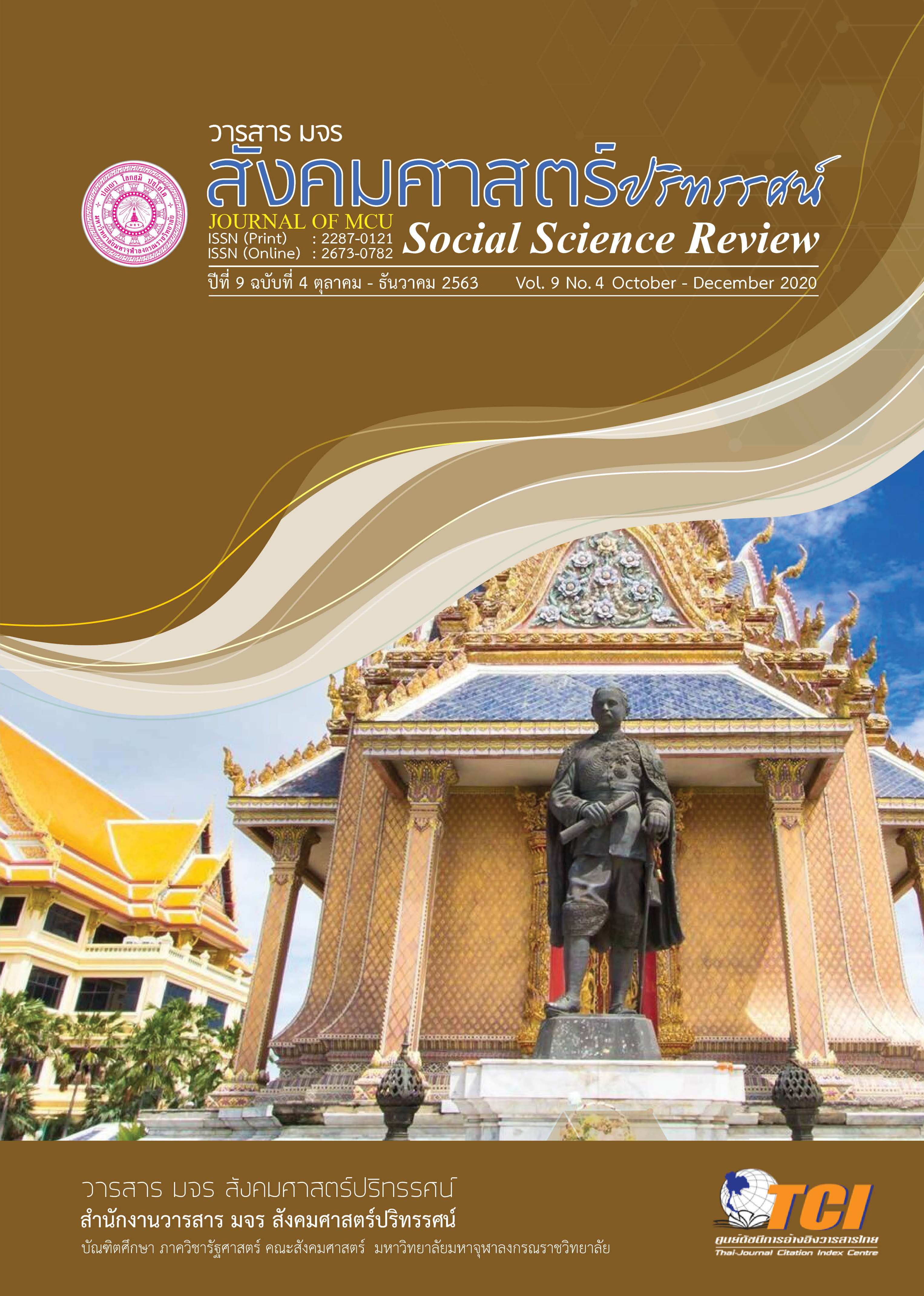การศึกษานโยบายสาธารณะกับมุมมองเชิงวาทกรรม
คำสำคัญ:
การศึกษานโยบายสาธารณะ, วาทกรรม, นโยบายสาธารณะเชิงวาทกรรมบทคัดย่อ
บทความเรื่องนี้มีวัตถุประสงค์เพื่อนำเสนอแนวทางการศึกษานโยบายสาธารณะ โดยเริ่มจากแนวทางการศึกษานโยบายสาธารณะแบบกระแสหลักที่ใช้ฐานแนวคิดตามหลักวิทยาศาสตร์และฟิสิกส์หรือเรียกว่า วิธีการศึกษาแบบปฏิฐานนิยม (positivism) ให้ความสำคัญและยึดถือข้อมูลเชิงประจักษ์ ซึ่งแม้ว่าจะง่ายต่อการวัดผลประเมินผลความสำเร็จของนโยบาย แต่วิธีการศึกษาดังกล่าวได้แยกข้อเท็จจริงกับคุณค่าออกจากกันอย่างสิ้นเชิง จึงขาดความเข้าใจถึงบริบททางสังคมตามความเป็นจริงที่มีความสลับซับซ้อน ทำให้การกำหนดนโยบายสาธารณะไม่ตอบโจทย์หรือไม่สามารถแก้ปัญหาตามที่สังคมต้องการอย่างแท้จริง นักวิชาการได้นำวิธีการศึกษาแนววิพากษ์มาทำการวิพากษ์แนวทางการศึกษานโยบายสาธารณะกระแสหลัก เกิดเป็นแนวทางการศึกษานโยบายสาธารณะโดยยึดแนวคิดหลังปฏิฐานนิยม (postpositivism) ที่มีหลักเหตุผลที่กว้างและเน้นการมีส่วนร่วมตามหลักความเป็นประชาธิปไตยมากกว่า อาทิเช่น การวิเคราะห์นโยบายแบบถกแถลงและการโต้แย้ง รวมไปถึงการศึกษาสิ่งที่มีอิทธิพลต่อกระบวนการที่ภาครัฐใช้ในการกำหนดนโยบายสาธารณะ ได้แก่ การศึกษานโยบายสาธารณะเชิงวาทกรรม ซึ่งเป็นวิธีการที่ภาครัฐต้องการให้เกิดความร่วมมือจากประชาชนในการปฏิบัติตามนโยบายที่รัฐกำหนดขึ้นผ่านวิถีปฏิบัติของวาทกรรม
เอกสารอ้างอิง
ณัฏฐณิชา เลอฟิลิแบร์ต. (2557). ผลกระทบจากการบริโภคเครื่องดื่มแอลกอฮอล์. ใน นพพล วิทย์วรพงศ์ (บรรณาธิการ), ทศวรรษศูนย์วิจัยปัญหาสุรา: สถานะความรู้เพื่อการควบคุมการบริโภคเครื่องดื่มแอลกอฮอล์. (หน้า 95-127). กรุงเทพฯ: โรงพิมพ์เดือนตุลา.
ธนวัฒน์ พิมลจินดา. (2560). นโยบายสาธารณะ (Public Policy). ชลบุรี: วิทยาลัยการบริหารรัฐกิจ มหาวิทยาลัยบูรพา.
ธนวัตร มัททวีวงศ์. (2559). การวิเคราะห์วาทกรรมเชิงวิพากษ์ในรายการคืนความสุขให้คนในชาติ (วิทยานิพนธ์ปริญญาวารสารศาสตรมหาบัณฑิต สาขาวิชาการบริหารสื่อสารมวลชน). กรุงเทพฯ: มหาวิทยาลัยธรรมศาสตร์.
เรืองวิทย์ เกษสุวรรณ. (2552). นโยบายศาสตร์เชิงวิพากษ์. วารสารพัฒนบริหารศาสตร์, 49(1 พิเศษ), 41-66.
ศูนย์วิจัยเพื่อการพัฒนาสังคมและธุรกิจ. (2560). รายงานฉบับสมบูรณ์ โครงการประเมินผลการรณรงค์ “งดเหล้าเข้าพรรษาปี 2560” : กรณีศึกษาประชาชนอายุ 15 ปีขึ้นไปใน 12 จังหวัดทั่วทุกภูมิภาคของประเทศ. กรุงเทพฯ: ศูนย์วิจัยเพื่อการพัฒนาสังคมและธุรกิจ.
Bohman, J. (2004). Critical theory and democracy. in Rasmussen, David et al. Critical Theory, Volume III: Subjectivity, Ethics and Politics. London: Sage Publications.
deLeon, P., & Overman, E. S. (1998). A history of the policy sciences. In Rabin et al. Handbook of Public Administration (2nd ed.). New York: Marcel Dekker.
deLeon, P. (2006). The historical roots of the field. in Moran et al. The Oxford Handbook of Public Policy. Oxford: Oxford University Press.
Dye, R. T. (1984). Understanding Public Policy (5th ed.). Englewood Cliffs, NJ: Prentice Hall.
Fischer, F. (1998). Beyond empiricism: Policy inquiry in postpositivist perspective. Policy Science Journal. 26(1), 129-146.
________. (1990). Politics, Values, and Public Policy: The Problem of Methodology. Colorado: Westview Press.
________. (2003). Reframing Public Policy. Oxford: Oxford University Press.
Fairclough, N. (1995). Critical discourse analysis. The critical study of language. London: Edward Arnold.
Foucault, M. (1972). The Archaeology of Knowledge; and, The Discourse on Language. Pennsylvania State University.
Hajer, et al. (2003). Deliberative Policy Analysis: Understanding Governance in the Network Society. Cambridge: Cambridge University Press.
Lasswell, H. (1988). Politics: Who Gets What, When, and How. New York: St. Martin’s Press.
Lasswell, H., & Kaplan, A. (1970). Power and Society. New Haven: Yale University Press.
Morrow, R. A., & Brown, D. D. (1994). Critical Theory and Methodology. California: Sage Publications.
Parker, I. (1992). Discourse dynamics: Critical analysis for social and individual psychology. London: Routledge.
Dijk, V. (1998). Principles of critical discourse analysis. Retrieved March 20, 2020, from http://www.discourses.org/OldArticles/Principles%20of%20critical%20discourse%20analysis.pdf
Wetherell, M. (2001). Debates in Discourse Research. In Discourse Theory and Practice: A Reader. London: Sage Publications.
ดาวน์โหลด
เผยแพร่แล้ว
รูปแบบการอ้างอิง
ฉบับ
ประเภทบทความ
สัญญาอนุญาต
ลิขสิทธิ์ (c) 2020 วารสาร มจร สังคมศาสตร์ปริทรรศน์

อนุญาตภายใต้เงื่อนไข Creative Commons Attribution-NonCommercial-NoDerivatives 4.0 International License.
เพื่อให้เป็นไปตามกฎหมายลิขสิทธิ์ ผู้นิพนธ์ทุกท่านต้องลงลายมือชื่อในแบบฟอร์มใบมอบลิขสิทธิ์บทความให้แก่วารสารฯ พร้อมกับบทความต้นฉบับที่ได้แก้ไขครั้งสุดท้าย นอกจากนี้ ผู้นิพนธ์ทุกท่านต้องยืนยันว่าบทความต้นฉบับที่ส่งมาตีพิมพ์นั้น ได้ส่งมาตีพิมพ์เฉพาะในวารสาร มจร สังคมศาสตร์ปริทรรศน์ เพียงแห่งเดียวเท่านั้น หากมีการใช้ภาพหรือตารางหรือเนื้อหาอื่นๆ ของผู้นิพนธ์อื่นที่ปรากฏในสิ่งตีพิมพ์อื่นมาแล้ว ผู้นิพนธ์ต้องขออนุญาตเจ้าของลิขสิทธิ์ก่อน พร้อมทั้งแสดงหนังสือที่ได้รับการยินยอมต่อบรรณาธิการ ก่อนที่บทความจะได้รับการตีพิมพ์ หากไม่เป็นไปตามข้อกำหนดเบื้องต้น ทางวารสารจะถอดบทความของท่านออกโดยไม่มีข้อยกเว้นใดๆ ทั้งสิ้น





